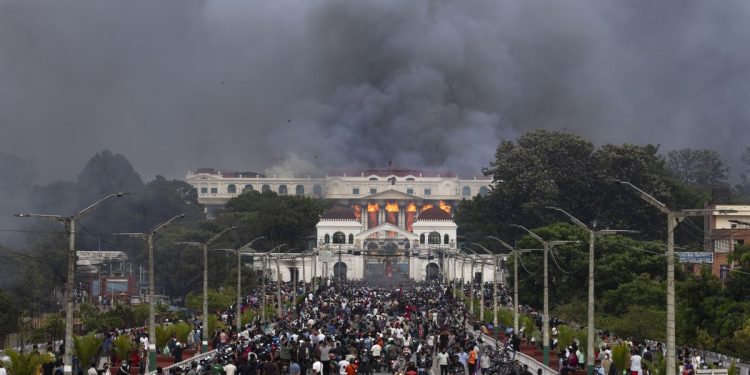By Miguel Angel Hernandez, a leader of the Venezuelan Socialist Workers’ Party (PSL) and the IWU-FI
On 8 September, protests against corruption erupted in Nepal following the government’s ban on several social media platforms. Protests started peacefully but turned violent after security forces intervened, resulting in 22 deaths and over 100 injuries.
The population of Nepal is estimated to be 30.5 million people. It is in South Asia, bordering India and China, with a Hindu and Buddhist majority. Surrounded by the Himalayan Mountain range, the so-called “roof of the world,” it is home to several of the world’s highest peaks, including Mount Everest.
On Tuesday, Prime Minister Khadga Prasad Oli resigned because of the massive protests that erupted in Kathmandu, the country’s capital, and spread to cities such as Pokhara and Itahari. The resignation of Home Minister Ramesh Lekhak, who resigned during a cabinet meeting, followed the prime minister’s resignation.
A class-conciliation capitalist government governs Nepal. A coalition of liberal bourgeois parties alongside the Communist Party of Nepal (CPN, Unified Marxist-Leninist), a Maoist party. The resigning prime minister is a member of the CPN.
A long and bloody civil war against the monarchy engulfed Nepal between 1996 and 2006. The provisional government of the Seven Party Alliance, a coalition of liberal bourgeois parties, and the Communist Party of Nepal (CPN) signed an agreement that year. In 2008, a Constituent Assembly abolished the monarchy and established a parliamentary democratic republic.
This is a class-based conciliation government in which the Communist Party takes part, with employers’ parties, which creates confusion about its true capitalist nature. Like Venezuela and Nicaragua, they claim socialism while using capitalist austerity and working with corporations.
Nepal’s major trading partners are India, China, and the United States. Nepal’s foreign investment grew due to a 2022 IMF agreement, fueling unemployment and unrest.
Among the major transnational corporations present in Nepal are Unilever, Coca-Cola, Dabur, an Indian consumer goods company, especially in healthcare; Suzuki, Honda, Hyundai; Verisk Nepal, an American software company; Cotiviti Nepal, another American software company, also specializing in Artificial Intelligence; Fuse machines, an American company specializing in Artificial Intelligence, among many others.
Social Media and Popular Anger
As we mentioned before, the spark that ignited the popular uprising was the suspension on 4 September of 26 social media platforms, including YouTube, X, Facebook, Instagram, and WhatsApp, because they had not met the registration deadline with the corresponding government agencies. Authorities took this measure against the misuse of the platforms, which allegedly allowed “some users” to spread hatred and rumors, commit cybercrimes, and disrupt social harmony.
Popular sectors, particularly young people, as an attempt to censor and suppress criticism of the nepotism and ostentation of the regime’s top officials and their children .
Thousands of protesters stormed the parliament building in defiance of the government’s curfew, subsequently setting it on fire, even torching an ambulance, and clashing with police.
Popular anger, accumulated over years of unfulfilled promises, frustration over poor salaries, unemployment, and rampant corruption, erupted with the suspension of social media. Protesters attacked and burned the homes of some officials perceived as corrupt. Rajyalaxmi Chitrakar, wife of former Prime Minister Jhalanath Khanal, died after her residence was set on fire. Protesters beat the finance minister and threw him naked into a river, and they also beat other officials during the protests. Even the headquarters of a private media outlet, the Kantipur Media Group, Nepal’s largest media conglomerate, which includes Nepali and English-language newspapers and television channels, was burned down.
Poverty, corruption, and inequality: the origin of the protests
The origin of the protests must be found in the tremendous poverty suffered by Nepal’s working people, which contrasts with the luxuries and ostentation of political leaders and their families.
Most young Nepalis feel frustrated and without a future, overwhelmed by inequality and unemployment. The youth unemployment rate in Nepal was 20 per cent last year, according to the World Bank. Per capita income is about $1,300 a year; 7.5 per cent of the population is working abroad, and diaspora transfers support domestic consumption.
Meanwhile, the leaders of the three main parties—the Nepali Congress, the Communist Party of Nepal (CPN-UML), and the Communist Party of Nepal (Maoist Centre)—have been linked to scandals ranging from the so-called Bhutanese refugee scam to land grabbing. Gold smuggling, corruption in reconstruction after the 2015 earthquake, and during the pandemic with the management of Covid-19 vaccines.
More recently, there was the case of a network that deceived citizens into travelling to Spain under the false pretext of attending a UN conference.
Generation Z Takes to the Streets
Weeks before the social media ban, groups of young people developed a social media campaign, through TikTok videos, highlighting the luxurious lifestyles of politicians’ children, who shamelessly flaunt their mansions, luxury vehicles, trips abroad, and studies at European universities. This contrasts with the poverty, unemployment, and lack of opportunities for millions of young people from working-class backgrounds.
Young people who identify as “Generation Z has led the protests,” born between 1997 and 2012. The social media-driven campaign and the call for mobilizations featured two hashtags: “Nepo Baby” and “Nepo Kids.” “Nepo” is short for nepotism. These viral hashtags expose officials’ lavish lifestyles.
From the International Workers’ Unity-Fourth International (IWU-FI), we unconditionally support the mobilisations in Nepal and stand in solidarity with the struggle of Nepal’s youth and working people.
The social uprising in Nepal, a rarely discussed country, is yet another expression of the profound crisis facing the capitalist system in its phase of imperialist decline. An absurd and unequal system that subjects people to misery and hunger, while politicians and business managers enjoy all kinds of privileges, protected by state control and the countries’ natural resources.
Corruption, ostentation, and the poverty of millions are the breeding ground for popular rebellions, challenging capitalist governments.













